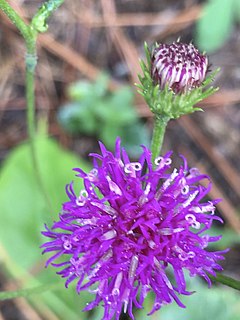
Actaea, commonly called baneberry, bugbane and cohosh, is a genus of flowering plants of the family Ranunculaceae, native to subtropical, temperate and subarctic regions of Europe, Asia and North America.

Vernonia is a genus of about 350 species of forbs and shrubs in the family Asteraceae. Some species are known as ironweed. Some species are edible and of economic value. They are known for having intense purple flowers. The genus is named for the English botanist William Vernon. There have been numerous distinct subgenera and subsections named in this genus, and some botanists have divided the genus into several distinct genera. For instance, the Flora of North America recognizes only about twenty species in Vernoniasensu stricto, seventeen of which are in North America north of Mexico, with the others being found in South America.

Actaea spicata, the baneberry or herb Christopher, is a species of flowering plant in the genus Actaea, native from Europe to western Siberia and northern Iran. It is often found on limestone edges and in deciduous woodland; key factors are shade, low competition, and a cool, protected root run.

Actaea pachypoda, the white baneberry or doll's-eyes, is a species of flowering plant in the genus Actaea, of the family Ranunculaceae.

Vernonia cockburniana is a species of flowering plant in the Asteraceae family. It is endemic to Yemen. Its natural habitats are subtropical or tropical dry forests and subtropical or tropical dry shrubland.
Vernonia djalonensis is a critically endangered species of plants in the family Asteraceae. It is native to the West African country of Guinea.

Vernonia acaulis is a species of perennial plant from family Asteraceae. It is native to the U.S.A.
Vernonia alleizettei is a species of flowering plant in the aster family, Asteraceae. It is endemic to Madagascar.
Vernonia ampandrandavensis is a species of perennial plant in the family Asteraceae. It is endemic to Madagascar.
Vernonia andapensis is a species of perennial plant in the family Asteraceae. It is endemic to Madagascar.
Vernonia aosteana is a species of perennial plant in the family Asteraceae. It is native to Zimbabwe.
Vernonia beddomei is a species of perennial plant in the family Asteraceae. It is endemic to India.
Vernonia coerulea is a species of perennial plant in the family Asteraceae. It is endemic to the Lesser Sunda Islands.

Vernonia colorata is a species of plant in the family Asteraceae. It is endemic to tropical and southern Africa.
Vernonia flaccidifolia is a species of flowering plant in the family Asteraceae. It is native to Georgia, Tennessee, and Alabama.
Vernonia schweinfurthii is a species of plant in the family Asteraceae. It is native to Angola, Burundi, Cameroon, Central African Repu, Ivory Coast, Malawi, Nigeria, Rwanda, Sudan, Zambia. One subspecies is recognized: Vernonia schweinfurthii var. bukamaensis.
Vernonia dewildemania is a species of plant in the family Asteraceae. It is native to Zambia and the Democratic Republic of the Congo.

Vernonia angustifolia is a species of flowering plant in the family Asteraceae, native to the southeastern United States. It was first described by André Michaux in 1803.

Vernonia fasciculata, the smooth ironweed or common ironweed, or prairie ironweed is a species of perennial plant from family Asteraceae. It is native to Manitoba in Canada and the north-central U.S.A.








